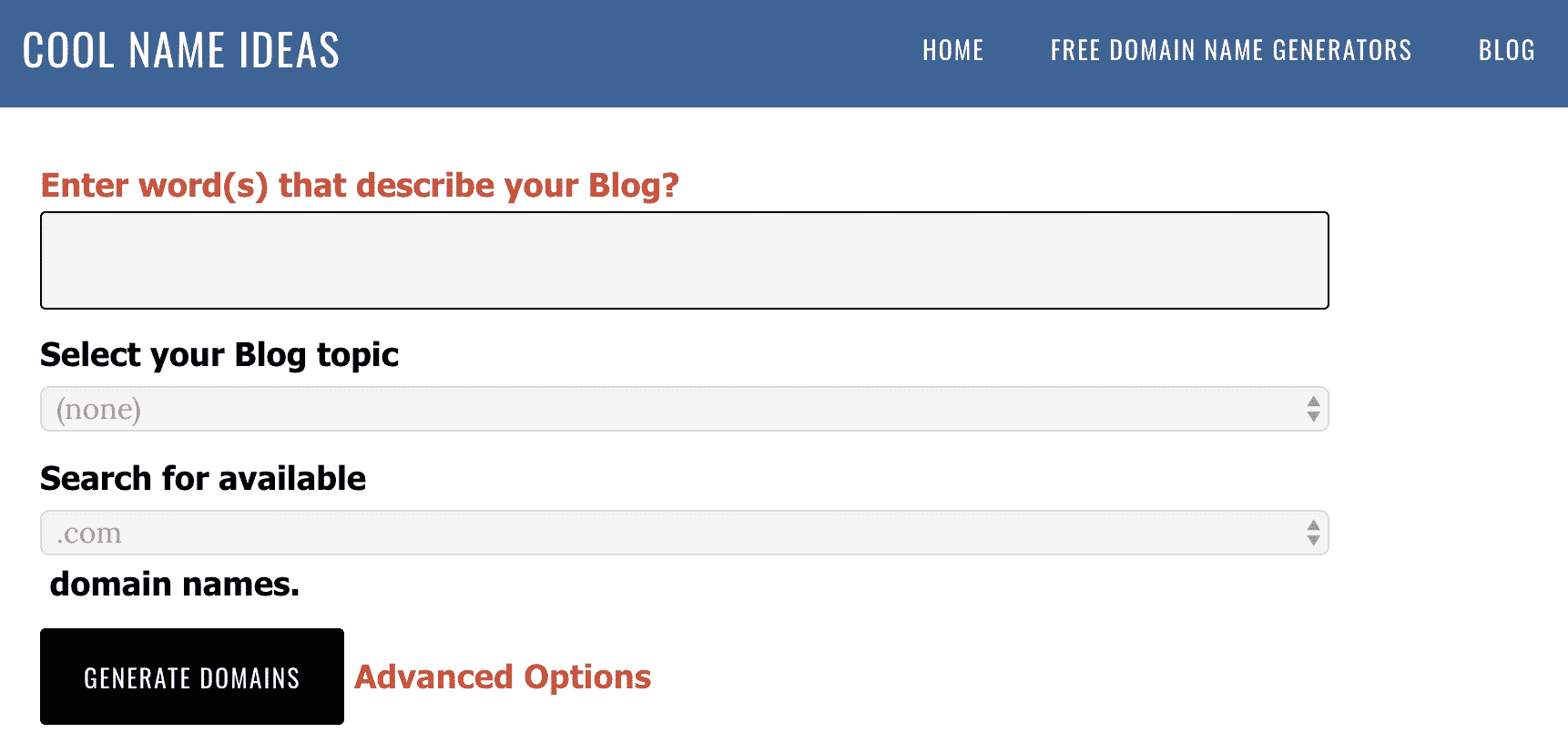What’s in a name? Well, quite a lot as far as brand power is concerned. The right use of blog naming can catapult a business into becoming synonymous with its products – just ask Coca-Cola, Hoover, and Sellotape.
In the Blogosphere, it’s no different. In fact, it could be even more pertinent to get the name of your blog right because it’s your product, and there are a lot of competitors out there.
But don’t get too bogged down in trying to come up with a catchy name – it’s a fun process! And it’s your chance to show off just how creative your blog will be. But as all of the most creative people in the world need a muse, we’ve produced this article – to hopefully play the Dora Maar to your Pablo Picasso…only with less painting and more fancy words.
1. Think of what your blog is really about
This is an important and often undervalued aspect of the naming process of your blog. Yes, you can choose a name that’s entirely unrelated to your pages, and the likes of Apple are instantly recognisable despite an ambiguous use of naming – but when you’re establishing a blog in 2020 amongst a sea of 100s of millions of competitors, it’s probably best to keep your nouns relevant.
Have a brainstorm, and try to categorise your blog in a list of buzzwords. It’s important to consider whether your blog is specific to a location, or audience and use that in your potential list of words that can be used to create the perfect name.
2. Think of who your audience really is
Speaking of audience, you’ll need to take a step back and have a think about who they are as well. Afterall, it’s your readers that you’re writing for.
If your target audience is a little bit older, then it’s a bad idea to incorporate any slang into your blog name, and likewise, if you’re building a blog for teenagers then it would be unwise to use complex and lesser-known words.
Try to get into the minds of your audience and figure out the terminology that appeals to them – what keywords would they best respond to?
3. Use a name generator
If you’re in need of a little extra help, then look no further than the internet. There are tons of websites out there that offer to quickly generate potential blog names from a single keyword search, and for free too. Websites like Cool Name Ideas should give you some great ideas:

Other tools like Wordoid, Namemesh and Panabee, offer great services that can not only suggest thousands of relevant names but also show exactly which domains are available and which aren’t instantly – just to save you from chopping and changing tabs to check yourself.
4. Gather your buzzwords
Swallowing a thesaurus isn’t a bad idea when it comes to thinking up creative names and titles. If you’re good with your synonyms, then you’re well placed to get the right buzzwords that’ll show off your expertise without the risk of using bland, mundane words.
For example, if you’re looking to name a blog that’s relevant to the topic of travel – a quick look at the word’s synonyms on a thesaurus returns results like ‘excursion’, ‘globe-trotting’, ‘Wanderlust’, ‘wayfaring’ and ‘sightseeing.’ All, with a little creativity, can be converted into a catchy blog name that’s bound to stand out.
You should also take a moment to think about SEO, and what specific keywords could be used to get your pages noticed. It’s important to avoid picking the most common keywords in order to keep as unique as possible, while also being wary of lesser-known terms. Any clunky jargon that isn’t well-known should be kept away from your blog’s name.
5. Conduct a little bit of market research
Take a little look at likeminded blogs out there, and see what naming techniques they use to make themselves popular. There are plenty of sites that compete with each other for the limelight, so it’s worth seeing how their names have helped them gain a foothold on their audience share.
Different blog subjects have different audiences, so conducting research further afield may be a little bit riskier, but still, a great name is a great name.
If the more successful competitors in your industry have a trend of adding their name to their blogs or being self-referential in the name then perhaps this is what audiences respond to best. Maybe informative blog titles work best in your niche. Take a little look around you to spot what works and what doesn’t.
6. Using a language other than English may give your blog a certain “je ne sais quoi”
There are some things in life that are so beautiful that the English language just doesn’t do them any justice – and some languages have words and phrases that don’t even exist in English. My favourite example is ‘l’esprit de l’escalier’, which is a French term for when you think of a perfect reply in a conversation that’s already ended. Lovely.
There are plenty of great words in other languages that are bound to be alluring and bring intrigue. Even De La Soul used simple Spanish words to great effect in coming up with a name.
So if you’re bored of bland synonyms, why not try taking a look at how your blog would sound if it had a little bit of French, German, Spanish, even Finnish in its name?
7. Think outside of the box when it comes to taking inspiration
Your market research doesn’t have to be limited to checking out competitors. You can take inspiration from literally anywhere.
Take a look deeper into your industry, and at the terms associated with it. Use tools like Word Association Lookup:

You could even keep a notepad handy, or a word processor open on your phone, just in case that perfect idea pops into your head while you’re watching TV or reading a book. Sometimes the ideal phrase can jump out at you when you least expect it.
8. A little bit of wordplay goes a long way
Wordplay is fun, even when your stress levels are being raised by scouring your brain for a witty blog name.
This method is great if you’re set on using a particular keyword, but need to adapt it to find an unoccupied domain.
Take a word that you would like to use and play about with it. Add prefixes, suffixes, verbs, adjectives, alliteration, anything you can think of that could provide an edge to your name.
9. Remember to keep it memorable
Sometimes you can be so preoccupied with finding a name that fits that you forget that it needs to be something that audiences will remember. There’ll be large portions of your readership that’ll click onto your posts, enjoy what they see, then 24 hours later forget where they read it. You can prevent this by finding a name that they’ll never forget.
Here, it pays to keep your blog name short and sweet, which isn’t necessarily easy in a saturated market. You should also avoid using a name that’s too generic. Otherwise, your blog will be lost in a quagmire of similar pages. Traditionally, rhyming names and alliteration work very well in being stored for longer in peoples’ minds – but remember to ensure that the name makes sense too.
10. Humour can make an eye-catching name
In my hometown, there’s an iconic takeaway shop called ‘Abra Kebabra.’ Is it known for the quality of its food? Definitely not. In a nearby town, there’s a fish and chip shop called ‘The Codfather.’ In these cases, their quirky pun-based names do a lot of the work in attracting visitors.
The same is very much possible for your blog. People respond well to humour and are more likely to click on your links if they enjoy your name. But bear in mind that it’s very theme-oriented. If your blog’s intended theme is funeral services, then you might not be doing yourself any favours by using a pun – though your blog might find its way onto a few memes instead.
11. Alliteration will resonate for longer
We’ve touched on the power of alliteration a little bit throughout this list, and it’s because the alliterative power of names can be a strong method of keeping your blog in the minds of readers for long after they’ve clicked off your site.
It’s a tactic that’s used a lot in marketing, and you might find that searching strong and relevant alliterative name can be a bit of a wild goose chase with how readily they’re snapped up by webmasters, but they’re a great tool if you can conjure one with some out-of-the-box thinking.
12. There are no rules against making your own words
Who says your name needs to contain real words? Some of the best companies in the world have come from creating titles from amalgamations and chopped up phrases – just look at Pepsi, Amtrak, or Natwest.
Making up a word that’s loosely themed on your ideal keyword also gives you a wealth of control over how you can make it sound. There’s also nothing stopping you from more simple tactics, like swapping an ‘O’ for a ‘0’ in your title to gain prominence for a recognisable word. The sky’s really the limit when you throw the dictionary out of the window.

